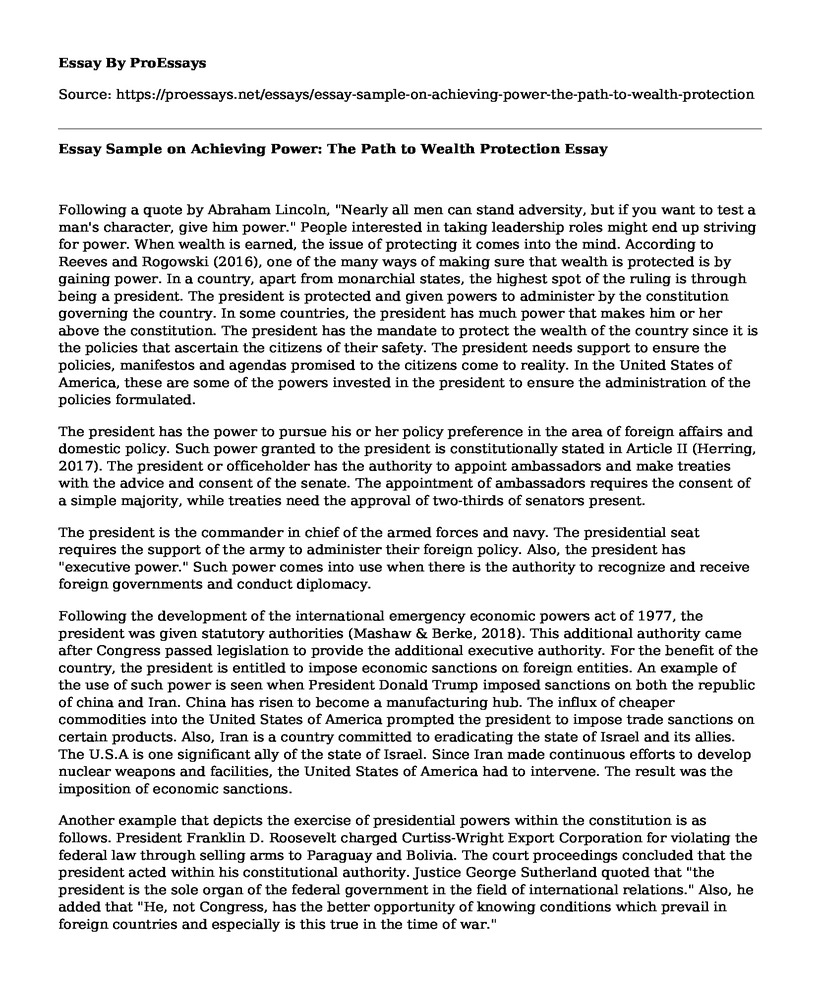Following a quote by Abraham Lincoln, "Nearly all men can stand adversity, but if you want to test a man's character, give him power." People interested in taking leadership roles might end up striving for power. When wealth is earned, the issue of protecting it comes into the mind. According to Reeves and Rogowski (2016), one of the many ways of making sure that wealth is protected is by gaining power. In a country, apart from monarchial states, the highest spot of the ruling is through being a president. The president is protected and given powers to administer by the constitution governing the country. In some countries, the president has much power that makes him or her above the constitution. The president has the mandate to protect the wealth of the country since it is the policies that ascertain the citizens of their safety. The president needs support to ensure the policies, manifestos and agendas promised to the citizens come to reality. In the United States of America, these are some of the powers invested in the president to ensure the administration of the policies formulated.
The president has the power to pursue his or her policy preference in the area of foreign affairs and domestic policy. Such power granted to the president is constitutionally stated in Article II (Herring, 2017). The president or officeholder has the authority to appoint ambassadors and make treaties with the advice and consent of the senate. The appointment of ambassadors requires the consent of a simple majority, while treaties need the approval of two-thirds of senators present.
The president is the commander in chief of the armed forces and navy. The presidential seat requires the support of the army to administer their foreign policy. Also, the president has "executive power." Such power comes into use when there is the authority to recognize and receive foreign governments and conduct diplomacy.
Following the development of the international emergency economic powers act of 1977, the president was given statutory authorities (Mashaw & Berke, 2018). This additional authority came after Congress passed legislation to provide the additional executive authority. For the benefit of the country, the president is entitled to impose economic sanctions on foreign entities. An example of the use of such power is seen when President Donald Trump imposed sanctions on both the republic of china and Iran. China has risen to become a manufacturing hub. The influx of cheaper commodities into the United States of America prompted the president to impose trade sanctions on certain products. Also, Iran is a country committed to eradicating the state of Israel and its allies. The U.S.A is one significant ally of the state of Israel. Since Iran made continuous efforts to develop nuclear weapons and facilities, the United States of America had to intervene. The result was the imposition of economic sanctions.
Another example that depicts the exercise of presidential powers within the constitution is as follows. President Franklin D. Roosevelt charged Curtiss-Wright Export Corporation for violating the federal law through selling arms to Paraguay and Bolivia. The court proceedings concluded that the president acted within his constitutional authority. Justice George Sutherland quoted that "the president is the sole organ of the federal government in the field of international relations." Also, he added that "He, not Congress, has the better opportunity of knowing conditions which prevail in foreign countries and especially is this true in the time of war."
References
Herring, P. (2017). Presidential Leadership: The Political Relations of Congress and theChief Executive. Routledge.
Mashaw, J. L., & Berke, D. (2018). Presidential Administration in a Regime of SeparatedPowers: An Analysis of Recent American Experience. Yale J. on Reg., 35, 549.Retrieved fromhttps://heinonline.org/holcgibin/get_pdf.cgi?handle=hein.journals/yjor35§ion=17
Reeves, A., & Rogowski, J. C. (2016). Unilateral Powers, Public Opinion, and thePresidency. The Journal of Politics, 78(1), 137-151. Retrieved from:https://www.journals.uchicago.edu/doi/abs/10.1086/683433
Cite this page
Essay Sample on Achieving Power: The Path to Wealth Protection. (2023, Mar 01). Retrieved from https://proessays.net/essays/essay-sample-on-achieving-power-the-path-to-wealth-protection
If you are the original author of this essay and no longer wish to have it published on the ProEssays website, please click below to request its removal:
- Meaning of the Term "Roman Imperialism" Essay
- Essay Sample on the Connection Between Cultural Diplomacy and the Tourism Industry
- After Watching Genocide Organ Essay Example
- Essay Example on the American Party System
- Essay on State's Role in Economic Development: Neo-Liberalization & Globalization
- Govt Essential for Social Order: Its Role in Keeping Communities Civilised - Essay Sample
- Paper Example on Addressing Homelessness A Social Imperative







